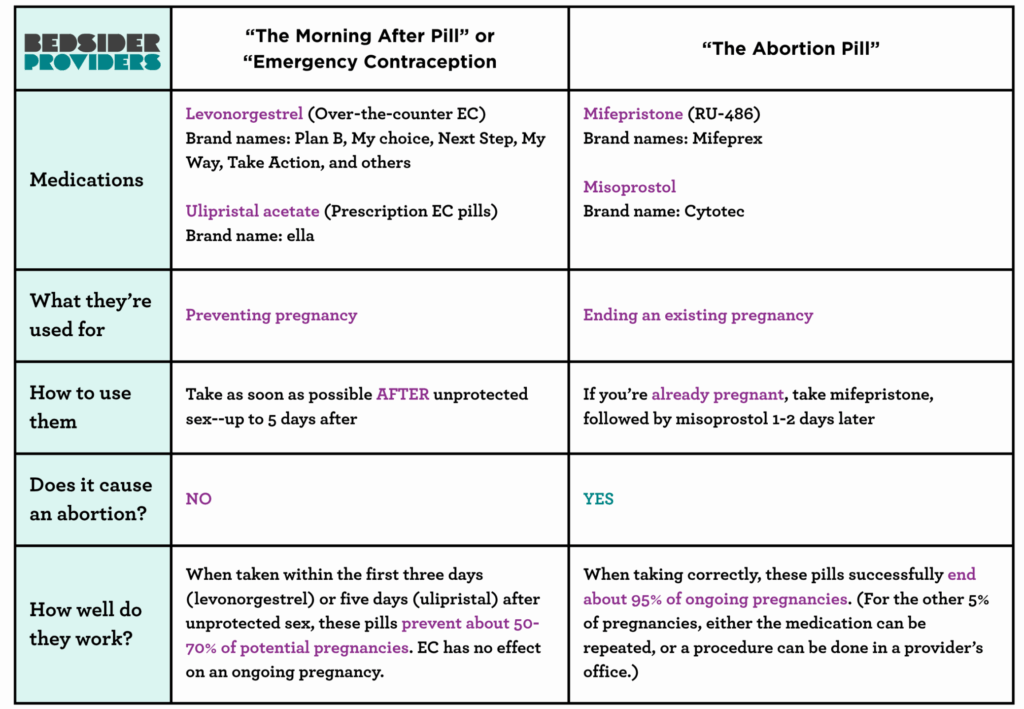This article was originally published in 2022 and has been updated with new information.
With everything circulating on social media, patients may be asking about the difference between emergency contraception (EC) pills, a.k.a. the morning after pill, and medication abortion, a.k.a. the abortion pill.
Recent findings from Power to Decide’s 2025 YouR HeAlth Survey show that 4 in 10 young people think EC and abortion pills are the same thing or aren’t sure. Here’s a quick guide to help you answer the most frequently asked questions, whether it’s from a patient, a family member, or your neighbor.
Are morning after pills and abortion pills the same thing?
Not at all! These are different medications that work in different ways in the body and are used for different purposes.
There are two types of oral EC (morning after) pills, both of which can be taken up to five days after unprotected sex:
- Levonorgestrel EC (LNG): available over-the-counter (OTC)
- Ulipristal acetate EC (UPA)–available by prescription-only
Both prevent pregnancy by delaying ovulation, which means the egg and sperm never meet and pregnancy never begins.
If people want more detail to understand how EC works to delay ovulation you can explain that ovulation is triggered by a spike of luteinizing hormone (LH). Both LNG and UPA EC pills work by slowing down LH production:
- UPA can delay ovulation even after the LH levels have started
- LNG doesn’t work once LH levels start rising, which makes taking LNG EC as soon as possible so important
That’s why UPA is more effective than LNG as EC and why LNG works best when taken as soon as possible. If LNG EC is taken after ovulation has occurred, research supports that it does not affect implantation. Unfortunately, this newer research is not currently included in the package insert for LNG EC pills. At the doses used for EC, UPA also does not affect implantation.
This handy chart has a side-by-side comparison of EC and medication abortion pills and can be shared with patients and others asking about the difference between these medications.

Will EC cause an abortion?
No. Both types of EC pills prevent a pregnancy by delaying ovulation. They do not end a pregnancy.
What happens if you take EC while you are pregnant?
If someone takes EC pills (or even regular birth control pills) while they are pregnant, research shows no effect on the ongoing pregnancies. EC will not cause a miscarriage or an abortion, and doesn’t affect fetal development.
Does taking EC pills or having an abortion now affect someone’s chances of getting pregnant in the future?
Neither impacts future fertility. Having an abortion ends a current pregnancy and does not affect future fertility or the ability to have healthy pregnancies.
Taking EC pills does not change someone’s ability to get pregnant later. Because it only delays ovulation, it’s possible that someone could get pregnant soon after taking EC. That means that if someone has unprotected sex after taking EC, you should counsel them to take EC again, even if it’s in the same cycle.
How do I get EC pills?
LNG EC pills are available OTC without a prescription or ID check for people of all ages and genders. That doesn’t mean that everyone has equal access. People can use Bedsider to find EC online or in person. Some college campuses even have EC vending machines installed to ensure 24/7 access at a lower cost than the drug store.
Since UPA requires a prescription, people need a health care visit, either in person or via telehealth. For prescribers, consider offering an advanced prescription to help people get timely access to UPA EC pills.
How do I get abortion pills?
Abortion pills and in-clinic abortion procedures are available through licensed providers. There are many telehealth options for accessing abortion pills safely. Patients can visit AbortionFinder.org for help finding an abortion provider.




